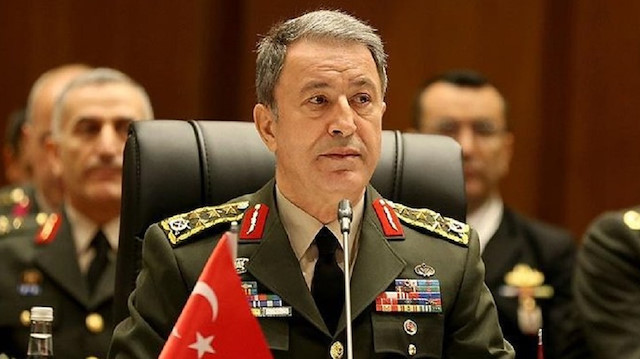
Turkey will not let terror corridor in country’s south and northern Syria, defense minister says
The U.S. training of YPG/PKK terrorists is not acceptable to Ankara, Turkey’s defense minister said on Wednesday.
Speaking at an event in the capital Ankara marking Bosnia and Herzegovina’s Armed Forces Day, Hulusi Akar said Turkey is determined to protect its rights in land, seas and air.
Turkey has long criticized U.S. cooperation with its “reliable” allies the PKK/YPG against Daesh, pointing out that the YPG is the Syrian branch of the PKK, a group recognized as terrorist by Turkey, the U.S., and the EU.
In its more than 30-year terror campaign against Turkey, the PKK -- listed as a terrorist organization by Turkey, the U.S. and the EU -- has been responsible for the deaths of some 40,000 people, including women and children. The YPG is its Syrian branch.
"Turkey will not let any terror corridor in country's south and Syria's north, including east of Euphrates river. So far Turkey has performed major fights against all terror organizations, PKK, YPG, Daesh, especially FETO, for peace in Turkey and the region and we will go on with our fight and operations with the same determination until the last terrorist is neutralized," Akar said.
FETO and its U.S.-based leader, Fetullah Gulen, is accused of orchestrating the defeated coup of July 15, 2016 which left 251 people martyred and nearly 2,200 injured.
The defense minister also criticized the West for not extending necessary contributions to cope up with the human tragedies in Syria and Iraq.
"Now we see that the world public opinion, which was deaf to the tragedy in Srebrenica, is now deaf to several similar tragic cases in Syria," he said, and added that Turkey respects all its neighbors' territorial integrities, especially that of Syria and Iraq.
Over 8,000 Bosnian Muslim men and boys were killed by Bosnian Serb forces after they attacked the UN "safe area" of Srebrenica in July 1995, despite the presence of Dutch troops tasked with acting as international peacekeepers.
Srebrenica was besieged by Serb forces who were trying to capture territory from Bosnian Muslims and Croats in an attempt to create their own state.
Hundreds of Bosnian families are still searching for missing loved ones, as a large number of victims were thrown into mass graves throughout the country during the Bosnian War, which spanned from 1992-1995.
Speaking about Turkey’s defense ties with Bosnia and Herzegovina, Akar said his country will continue to support the Bosnian army.
Hello, the comments you share on our site are a valuable resource for other users. Please respect other users and different opinions. Do not use rude, offensive, derogatory, or discriminatory language.
The floor is all yours.









